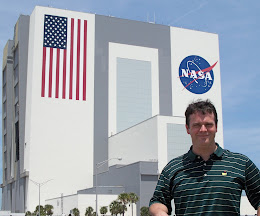 |
| Scott Kelly, |
CAPE CANAVERAL, Fla. -- American astronaut Scott J. Kelly and Russian cosmonaut Mikhail Kornienko are poised to lift-off from western Kazakhstan on Friday en route to begin a historic flight aboard the International Space Station as they spend one full year in space.
No American has spent greater than seven months in space on a single flight. NASA and the Russian Space Agency hope to determine how the human body can fight the environment of space and the lack of gravity to avoid decreased strength in both muscles and bone density, and levels of radiation exposure caused by solar flares.
"Some day we're gonna go to Mars, and we have the facilities on board the space station to really study the effects of space on longer duration space flights," Kelly said from the Kazakhstan launch site. "Having the capability that the International Space Station provides to study the human element of this is going to be significantly better than before."
Russian Valeri Polyakov endured a record 438 days in space on a single mission beginning in 1994. He and three fellow cosmonauts are the only humans who have spent a full year or more in space during a space mission.
"Kelly and Kornienko will spend a year on the space station to better understand how the human body reacts and adapts to the harsh environment of space," NASA spokesperson Stephanie Schierholz said. "Data from the expedition will be used to determine whether there are ways to further reduce the risks on future long-duration missions to an asteroid and eventually Mars."
As Navy Capt. Kelly spends one year in earth orbit, he and his identical twin brother Mark Kelly on Earth will take routine biomedical samples at about the same time. NASA scientists will use their fluid and cell samples to compare and contrast the human body's reactions to life in microgravity and the harmful radiation which surrounds the orbiting laboratory.
"Data and samples will be collected throughout the year from a series of studies involving Scott and his twin brother, Mark," Schierholz added. "The studies will compare data from the genetically-identical Kelly brothers to identify any subtle changes caused by spaceflight."
Kelly and Kornienko and cosmonaut Gennady Padalka are due to launch from Baikonur Cosmodrome at 3:42 p.m. EDT (1:42 a.m. on Saturday local time) riding a top a Soyuz FG rocket. Nine minutes later, the trio will arrive in Earth orbit and begin steering their Soyuz TMA-16M spacecraft on an expedited trip to dock with the space station nearly six hours later.
Soyuz commander Padalka will guide their craft as they rendezvous and dock to the station's Poisk docking port four orbits following launch at 9:36 p.m. The hatches between the two spacecraft is expected to open about 90 minutes later allowing the new space trio to float into their new home greeted by current space station commander and NASA astronaut Terry Virts, Russian Anton Shkaplerov and Italy's Samantha Cristoforetti.
"We have certain phenomena that result from long duration space flight, and currently this new risk we have is the effect on our vision," Astronaut Kelly explained recently at the Johnson Space Center. "A lot of the science that is devoted to Mikhail and I as crew members are along those kind of lines -- your physical performance, your ability to function once you get back on Earth after such a long duration in space."
Kelly, who was in attendance and recognized by President Obama during the State of the Union address in January, will begin his expedition as a flight engineer for the first two-thirds of his flight. Kelly will then become commander in September, his second tour as the space station commander, a title he will hold until his departure.
During Kelly and Kornienko's year in space, they will participate in the relocation of two docking ports and the installation of two new International Docking Ports. Kelly will participate in a series of spacewalks to install the first new docking adapter this summer.
"The challenge for these guys is they're basically living in their office for an entire year," Emily Nelson, NASA Lead Flight Director for Kelly's final four months in space, said. "They're consummate professionals, they're going to do their job well from beginning to end... Those last four months, that's going to be one of our challenges is making sure we keep it upbeat and fun."
Following 51 weeks in space, Kelly and Kornienko will board the newer Soyuz TMA-18M craft with cosmonaut Sergey Volkov for their return trip to Earth, landing three hours later in central Kazakhstan.
Kelly's 180 days in space during three previous space flights added to next March's newly completed 342 days will give the astronaut the new American record of most time in space at 522 days. A record which may be short lived as NASA's Peggy Whitson will add nearly six months to her already cumulative duration of 377 days in space when she returns from her stay aboard the space station in May 2017.
You can follow Kelly's long duration mission as he shares tweets each day from space via @StationCDRKelly. "I felt like it would be interesting to do that in space," Kelly said. "One 140-character message a day, 'hey this is what I'm doing, this is how I'm feeling'. I'm not sure if I'm gonna be successful doing it everyday





